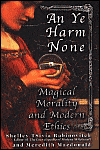
Authors Shelley Tsivia Rabinovitch and Meredith Macdonald resort to a typical tactic when writers run short on a topic. They add lists. Lists that give excess detail. An Ye Harm None consists of those lists, detailing every ethical decision a presumably Craft-centered neopagan might make, so conscientiously that if one person tried to operate on all of decisions provided, he or she would wind up frozen in place, afraid to move. Beyond the endless lists are assumptions about their audience and their political and spiritual inclinations, that render this book irrelevant to the modern neopagan ethos.
This book makes some incorrect assumptions about its audience that weakens the overall impact of the book. To clearly detail a neopagan ethos is to clearly detail the outlines of several religions; An Ye Harm None only really details one faith while slapping the labels of “Wicca, Pagan, neopagan, Craft” onto their version of the Craft with little judgment. Rabinovitch and Macdonald also presume their reading demographic to consist of the socially and politically liberal, to place environmental conscience as a priority on par with religious conscience and to place such a heavy preference on neopagan religious expression that it would be preferable to boycott the Salvation Army. While these assumptions likely made the book much easier to write and to pitch to a publisher, the face of neopaganism has changed. The neopagan set most likely to pick up a book on ethics has far less idealism and far more critical eyes than a newly-attracted dedicant. While this more sophisticated audience has its share of environmentalists and activists, it also has its share of gun-toting libertarians and conservative Republicans who bear no objection towards Christian proselytizing. It’s a far different world – and far different ethic – from where neopaganism began.
Rabinovitch and Macdonald took on a big job in writing this book, and while they failed to plunge into the diversity of neopagan ethics, they deserve credit for the attempt. This seven chapter book with appendix tackles decisions regarding the environment, food, shelter, money, community and neopagan teaching. The appendix offers a directory of many nonprofit organizations with political causes in line with what the authors assume are the popular causes of their readers. The problem with An Ye Harm None lies in those assumptions. Neopaganism has far too much diversity to toe the left political line, and too many agitators to call that politic an ethic. For any reader outside the neopagan liberal paradigm, the book consequently makes for a tedious read.
The authors ignore altogether that multiple traditions have multiple ethical statements. Rather, the precepts of the book are founded upon the cliché assumptions of the Craft, repeated for over fifty years now: “An Ye Harm None, Do What Ye Will”, a metaphorical interpretation of the laws of karma, the Hermetic concept of “as above, so below”, an assertion that all neopagans view the earth as sacred, and the ceremonial concept of “thou art God/ess.” To the authors’ credit, they dug deeper than most on the phrase “An Ye Harm None,” and traced it to the works of the late Doreen Valiente. However, they err by mixing ethical conception with magical model. “Thou art God/ess” does not originate with neopagans despite inspiration from Heinlein. In fact, this concept applies to Christian or other monotheist ceremonial magicians, particularly those using the Biblical address “thou art God” to assert the dominance of a singular divinity. This mix of concepts clashes like plaid on paisley; “Harm None” goes with “Thou Art God” like a size six dress on a size sixteen frame.
Readers can find the saving grace of this book on page 9, in the introduction, where Rabinovitch makes the distinction: “Interpretations of the Rede and applications of it to daily life distinguish between hurt and harm. Hurt is short-term pain, unfortunate, but also unavoidable…Harm is the term reserved for permanent or long-term damage.” Beyond this single passage, An Ye Harm None is rife with detailed research void of the questions necessary to create deeper knowledge. The authors themselves do not question their own belief, and so cannot use this book to find deeper understanding. While applying the central tenet of this book to the Craft is acceptable, Rabinovitch and Macdonald err greatly by grouping the whole of neopaganism, and the whole of neopagan ethics, with the Craft.
~review by Diana Rajchel
by Shelley Tsivia Rabinovitch
and Meredith Macdonald.
Citadel Press, 2004. US $14.95
